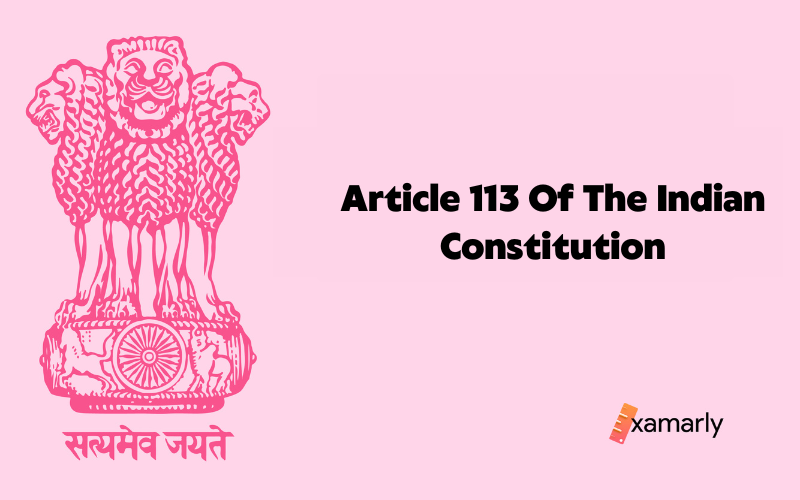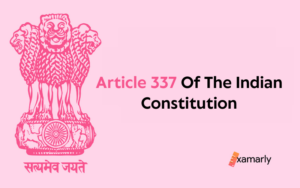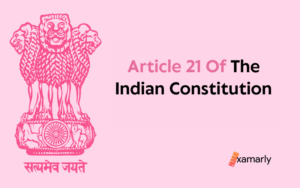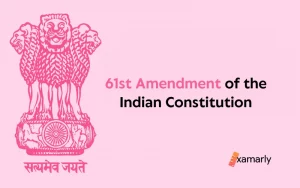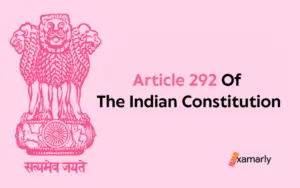Overview
Article 113 of the Indian Constitution talks about the procedures that have to be followed in the Parliament regarding the estimates of all the expenditures we discussed in Article 112 of the Indian Constitution.
It lays down the protocols for the presentation of the estimates in the Houses of Parliament. It also reflects on the concept of demand for grants, which is a crucial concept for this Article and for the financial aspect of the country as a whole.
Before digging deep into Article 113 of the Indian Constitution, let us go ahead and learn the concept of Demand for Grant.
What is the Demand For Grant?
In simpler terms, demand for grants is a lawful permission that has to be taken with the help of votes. Let us suppose that a particular ministry is in the requirement of the funds. It has to be given money from the Consolidated Fund of India. So, the ministry has to present the all expenses that it going to incur in order to meet its needs in a form of a Money Bill.
The Bill then will be present in the House of People (that is the Lok Sabha) as a part of the Union Budget. As a matter of fact, the Money Bill has to be presented after the President of India has approved it.
The bill will also include the annual financial statement which is also called the Union Budget. The Union Budget will also include a certificate issued by the President that will reflect his approval. This approval has been defined under Article 117 and Article 274 of the Indian constitution.
The Demands For Grants include two types of expenditures. The one that is to be voted in the Lok Sabha is called voted expenditure and the other does not have to be voted in the House Of People and is known as a voted expenditure.
The former includes all the expenses that are the liabilities of the government such as debts and interests among others. The latter are those expenses that are to be done in accordance with the governmental schemes and plans for the welfare of the country.
Article 113 Of The Indian Constitution – In Detail
We will understand each and every aspect of Article 113 of the Indian Constitution in detail by analyzing all the clauses present in the Article.
Clause 1 – As it is & Explained
“113. Procedure in Parliament with respect to estimates
(1) So much of the estimates as relates to expenditure charged upon the Consolidated Fund of India shall not be submitted to the vote of Parliament, but nothing in this clause shall be construed as preventing the discussion in either House of Parliament of any of those estimates”
The first clause of Article 113 of the Indian Constitution says that all the expenses that are to be taken out from the Consolidated Fund of India should not be voted in the Parliament, even when they are presented in the Lok Sabha, there have to be discussed and not to be voted.
This clause also mentions that nothing in this clause should hinder the discussion of these expenses in the Lok Sabha.
Clause 2 – As it is & Explained
“(2) So much of the said estimates as relates to other expenditure shall be submitted in the form of demands for grants to the House of the People, and the House of the People shall have power to assent, or to refuse to assent, to any demand, or to assent to any demand subject to a reduction of the amount specified therein”
The second clause of the aforementioned Article says that all the other expenses that are voted expenditure as we saw earlier in the article will have to be submitted in the Lok Sabha in the form of Demand Of Grants.
The Lok Sabha will have the power to either approve or disapprove any demand made by the ministry. The Lok Sabha also has the power to reduce the amount that has been demanded if it feels so.
Clause 3 – As it is & Explained
“(3) No demand for a grant shall be made except on the recommendation of the President”
The third clause of Article 113 of the Indian Constitution says that if a demand for a grant has to be made in the Lok Sabha, it has to be made only after the President of India recommends it. There is no provision to present a grant request unless the president agrees.
Summing Up
We can conclude from this article that the President of India has the authority to recommend anything on the Demand of a Grant.
Any provision that has to be made regarding the expenses in the Lok Sabha has to be followed according to the procedures mentioned in Article 113 of the Indian Constitution.
There are two kinds of expenditures, that will be presented. One is the charged expenditure that has to be only discussed and not voted and the other one is the voted expenditure that will be voted in Lok Sabha.
We got to know that even fiscal finances cannot be treated very casually and are governed by protocols and laws.
FAQs
What is the Demand For Grant?
In simpler terms, demand for grants is a lawful permission that has to be taken with the help of votes. Let us suppose that a particular ministry is in the requirement of the funds. It has to be given money from the Consolidated Fund of India. So, the ministry has to present the all expenses that it going to incur in order to meet its needs in a form of a Money Bill.
Can Demand For Grant be made without the interference of the President?
No, the Demand For Grant cannot be presented in the House Of People without the interference of the President.


